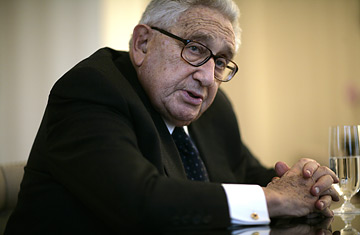
Henry Kissinger speaks during an interview in Washington.
Former Secretary of State Henry Kissinger is well acquainted with Vladimir Putin. TIME met with Kissinger in Washington and they discussed the Russian President's recent moves, his legacy, and how the U.S. should deal with a resurgent Russia.
Vladimir Putin's chosen successor, Dmitiri Medvedev, says he would like President Putin to stay in the Kremlin as Prime Minister. That doesn't sound much like a democratic transition.
Clearly Putin is the dominant personality in Russia today. Having headed the ballot of the United Russia Party that gained 64.3% of the vote, he controls the Russian parliament, the Duma. At the same time, I do not consider Russia a dictatorial state. A vote of 64.3% shows that there is a significant part of the population that did not vote for Putin. The position of Prime Minister has a different constitutional basis than president. There is therefore considerable scope for evolution. America must not confuse foreign policy towards Russia with seeking to prescribe historical processes. It is important to get our priorities right. Restructuring the domestic situation of Russia cannot be achieved by American designs — particularly in the short term. Russia is a vast country adjoining China, the Islamic world and Europe. Cooperative relations with it are important for peace and global solutions. Of course we have our preferences, and of course we have our sympathies, but we also have to deal with a government in Russia that exists. And we need some understanding for the adjustments required by a country in a period of transition.
How do you explain the gap between how President Putin is perceived by some in the West — as aggressive, authoritarian, undemocratic — and the support he enjoys among Russians?
In Russia, he is popular because he became President at what Russians consider a low point in their history. Putin became President during a period when the Soviet Empire had disintegrated and with it 300 years of Russian history. Economically, the Russian ruble collapsed. The Russian people judge him by the difference in the standard of living today compared to what existed when he took over.
They also value him for having restored Russia, in their mind, to a respected place in the international system. And probably many of them think that the system is more responsive to the public than previous systems, though we would not call it democratic by Western standards.
You've met him many times. What is he like in person?
He is extremely intelligent, very focused on the subject under discussion and very familiar with the issues in foreign policy. He does not try to sweep you away with personal charm. It is a combination of aloofness, considerable intelligence, strategic grasp and Russian nationalism.